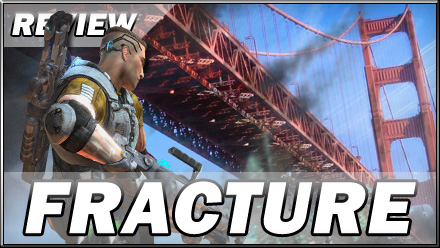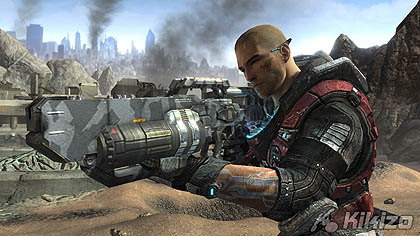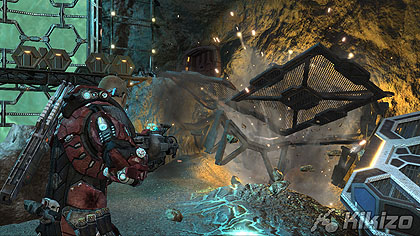Fracture
Does Fracture ultimately come together for LucasArts?
| Version 360, (PS3, PC) | Developer Day 1 Studios | Publisher LucasArts | Genre Action |
||||

Page: 1 2
By John Keating
It's astonishing what we'll be able to do in the future. If popular media is to be believed, skateboards will hover, silver foil will be the new black and we shall all don space marine suits for the nine to five rat race. LucasArts clearly shares such a clichéd vision in Fracture, an unfortunate yet enjoyable hackneyed third person shooter set in 2061.
The staggeringly average yet competent title borrows heavily from the cutting room floors of established franchises and is overly dependent on an ace up the sleeve. Day 1 Studios has traded off visual finesse, challenging AI and cutting edge gameplay pleasures to bring us a prospective innovation in the form of deformable terrain.
There have been many lauded claims of boundary pushing mechanics before, so veteran gamers have developed hardened skin and built up waxy ears to such trumpeted ideas. That's not to say we don't welcome change and fresh creativity but attempts at destructible scenery and manipulative environs usually have a depressing tendency to underwhelm. Technical limitations and the rules of physics are always there to keep the gamers' imagination and linear pathway in check. LucasArts and Day 1 have been shouting from the rooftops that Fracture is ripping up the rulebook.
However, to scrape away the spin and hyperbole is to discover the habitual, disappointing reality and a little lie as the deformable terrain, whilst working well, is woefully underpowered and underdeveloped. It would be fantastic to report that we've been shattering rock faces, causing seas to disappear, creating tectonic shifts and destruction on a scale never seen before on this medium, but that is sadly not the case
Fifty years from now, if the extent of deforming terrain is making 12ft high limited mammary shaped mounds and 6ft deep potholes, then no one will be making mountains out of molehills. Fracture's vehicle for deform - the 'Entrencher' gun - might be better suited to Alan Titchmarsh's Grandson and Ground Force '61 rather than exhilarating futuristic might.
Providing a slight tonic, the setting to Fracture is actually quite decent. The polar ice caps have melted and flooded the central plains of America, causing a natural division between East and West. After a political split and in a bid to combat global warming, the Pacificans dabble in genetics and cybernetic implants, which goes against policy dictated from humanist Washington. Cue a fierce battle not seen since Tupac and Notorious B.I.G went mano et mano, with drive-bys and bandanas being replaced by full scale civil war. The cyborgs are taking on the eco-warriors and perhas unfortunately, you can't put a cap in Swampy's ass; you're on the human preserving Altantian side.
Playing the role of generic marine Jet Brody (good grief), you are to take your Entrencher gun and play through three substantial acts of varying banal locales and enemies. With little recognition or cut scenes in game, each acts seem like one large level which is to its overall detriment. Progress is only really measured by seeing the auto save kick in from the time to time. Whilst slightly turgid, moving forward in the game is critically dependent on the Entrencher weapon - it's the major advantage that sufferer Jet has over his faceless cyborg chums. Again, it's just a shame it's employed more as a futuristic spade than as a robot terminating super weapon.
To this end, during quiet points in the game, Fracture will expect you to solve extremely basic puzzle elements that are as vexing as they are interesting. Elevated walkways are only accessible by raising the ground, and half buried doorways are surprisingly dug out by lowering the terrain. Both are well executed but the sheer repetition and blatancy of the quandaries leave little to get excited about. Much more variety was what the Doctor ordered but limitations of the physics and only being able to deform certain qualified areas render the puzzle element irksome and laboured.
Page: 1 2











 Satoru Iwata Video Interview - the late Nintendo president spoke with Kikizo in 2004 as 'Nintendo Revolution' loomed.
Satoru Iwata Video Interview - the late Nintendo president spoke with Kikizo in 2004 as 'Nintendo Revolution' loomed. Kaz Hirai Video Interview - the first of Kikizo's interviews with the man who went on to become global head of Sony.
Kaz Hirai Video Interview - the first of Kikizo's interviews with the man who went on to become global head of Sony. Ed Fries Video Interview - one of Xbox's founders discusses an epic journey from Excel to Xbox.
Ed Fries Video Interview - one of Xbox's founders discusses an epic journey from Excel to Xbox. Yu Suzuki, the Kikizo Interview - we spend time with one of gaming's most revered creators.
Yu Suzuki, the Kikizo Interview - we spend time with one of gaming's most revered creators. Tetris - The Making of an Icon: Alexey Pajitnov and Henk Rogers reveal the fascinating story behind Tetris
Tetris - The Making of an Icon: Alexey Pajitnov and Henk Rogers reveal the fascinating story behind Tetris Rare founders, Chris and Tim Stamper - their only interview? Genuinely 'rare' sit down with founders of the legendary studio.
Rare founders, Chris and Tim Stamper - their only interview? Genuinely 'rare' sit down with founders of the legendary studio. The History of First-Person Shooters - a retrospective, from Maze War to Modern Warfare
The History of First-Person Shooters - a retrospective, from Maze War to Modern Warfare